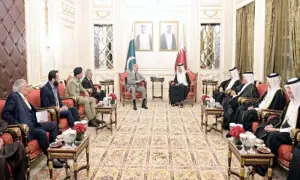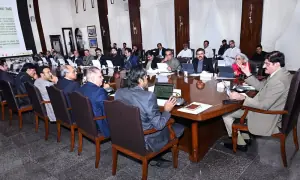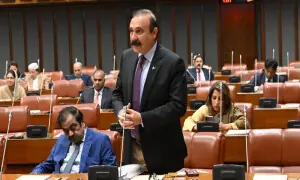‘Great firewall of Pakistan’: Govt prepares to approve OTT regulatory framework
3 min readThe government has accelerated its work on a framework to regulate over-the-top (OTT) services as another important step towards the “Great Firewall of Pakistan”.
The Pakistan Telecommunication Authority (PTA) has completed consultations with all stakeholders, and the OTT regulatory framework would be sent to the cabinet for approval after getting the authority’s nod.
Under the new framework, platforms like WhatsApp and Facebook would be required to obtain licences and authorisations. The new platform would also regulate Twitter, Facebook, LinkedIn, and e-commerce platforms and the PTA and PEMRA would jointly regulate digital media services.
According to the documents, the OTT services would be divided into three categories: communication services, application services, and media services.
Communication services, which include platforms like WhatsApp, Facebook, Viber, and all other communication platforms, would be required to obtain licenses and registrations.
Application services would include platforms such as Facebook, X, e-commerce, and LinkedIn.
According to the document, media services have been further divided into two categories: non-broadcasting services and broadcasting services.
Non-broadcasting services include platforms like YouTube, Netflix, and VOD while broadcasting services include the social media forums of television channels operating in Pakistan.
The entire regulatory framework would be structured under the PECA Act 2016, which also includes the PEMRA Ordinance 2002 and the PTA Act 1996.
The document states that internet-connected over-the-top application services fall under the purview of PTA. Under this framework, all stakeholders and companies would have to operate within local laws. Internet communication services would need to obtain OTT authorisation or a licence from the PTA. All communication platforms would be bound by PTA regulations, with the OTT authorisation or licence valid for 15 years.
Upon approval, all platforms would have to obtain registration or a licence from the authority within 12 months. The platforms would be required to ensure content safety, privacy, and compliance with local laws. In case of any dispute, the platforms will have to provide content to the relevant agency or officer.
Also, read this
Internet restrictions: VPN demand surges ‘6,000% in Pakistan’
Senator withdraws resolution seeking ban on social media platforms
JIT formed to probe culprits behind ‘malicious’ social media campaign
Companies would have to store their data within the country. In emergency situations, licence holders will be bound to provide location and general information.
OTT application services would have to comply with PECA laws instead of requiring a licence or authorisation. Media services would have to adhere to the PECA Act rather than obtaining a licence or authorisation. OTT broadcasting services would be subject to the PEMRA Ordinance 2002 and PECA laws while non-broadcasting services would also fall under this framework.
The document suggests that this over-the-top regulatory framework would be supportive of Pakistan’s “Great firewall system.”
For the latest news, follow us on Twitter @Aaj_Urdu. We are also on Facebook, Instagram and YouTube.
























Comments are closed on this story.